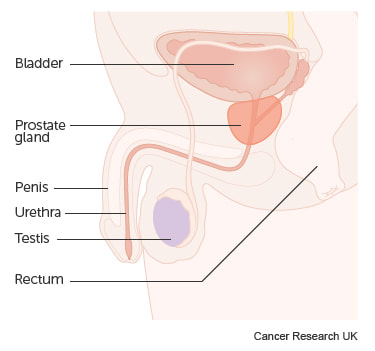Welcome
PROSTATE CANCER
Prostate cancer is a cancer that starts in the prostate gland.
The prostate gland is a size of a walnut on the base of the bladder in men. It is surrounded by a thin tube called a urethra that carries urine from the bladder to the penis. The urethra also carries sperm in a fluid called the semen.
According to Cancer Research UK, prostate cancer is common in older men particularly between 75 and 79 years old.
There are a number of causes and factors that increases risk for prostate cancer. For instance, older age, ethnicity where it is more common in the afro-Caribbean community than other races.
Other factors that increase risk includes if a member of the family have had prostate cancer. Therefore, some genes can be inherited such as BRCA1 and 2 and this can also lead to increase of other types of cancers of the breast and ovaries.
Having high levels of hormones, for instance, Insulin like growth factor (IGF-1) can also increase risk of prostate cancer. Normally, IGF-1 is required to regulate cell growth and death but studies have revealed that there is a link between high IGF-1 and risk of getting prostate cancer.
Other syndromes for example Lynch syndrome where a change in the gene of MLH1 and MSH2 increases risk of prostate cancer.
Prostate cancer is mainly detected through a blood test where there are high levels of a protein called prostate specific antigen (PSA).
The prostate gland is a size of a walnut on the base of the bladder in men. It is surrounded by a thin tube called a urethra that carries urine from the bladder to the penis. The urethra also carries sperm in a fluid called the semen.
According to Cancer Research UK, prostate cancer is common in older men particularly between 75 and 79 years old.
There are a number of causes and factors that increases risk for prostate cancer. For instance, older age, ethnicity where it is more common in the afro-Caribbean community than other races.
Other factors that increase risk includes if a member of the family have had prostate cancer. Therefore, some genes can be inherited such as BRCA1 and 2 and this can also lead to increase of other types of cancers of the breast and ovaries.
Having high levels of hormones, for instance, Insulin like growth factor (IGF-1) can also increase risk of prostate cancer. Normally, IGF-1 is required to regulate cell growth and death but studies have revealed that there is a link between high IGF-1 and risk of getting prostate cancer.
Other syndromes for example Lynch syndrome where a change in the gene of MLH1 and MSH2 increases risk of prostate cancer.
Prostate cancer is mainly detected through a blood test where there are high levels of a protein called prostate specific antigen (PSA).
PROSTATE CANCER UK
Prostate Cancer UK is the leading charity in the UK that aims to help men who are diagnosed with prostate cancer and help educate people on how it can be prevented when diagnosed early.
It has been a privilege to be a volunteer speaker for the charity to help raise awareness.
It has been a privilege to be a volunteer speaker for the charity to help raise awareness.
11th November 2015 - I was invited to speak about Prostate Cancer at Curzon Lecture Hall by Chi Mu Mu Chapter - An American society.
8th November 2019 - We raised awareness of Prostate Cancer to attendees of the car showcase that took place in National Exhibition Centre.
© COPYRIGHT 2024. ALL RIGHTS RESERVED.
Proudly powered by Weebly

